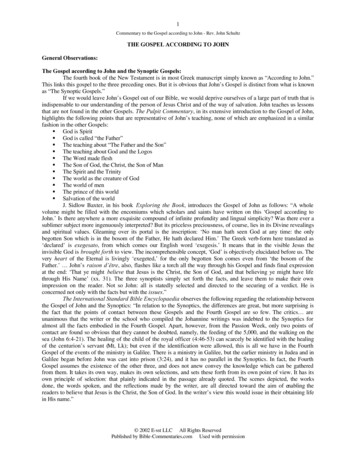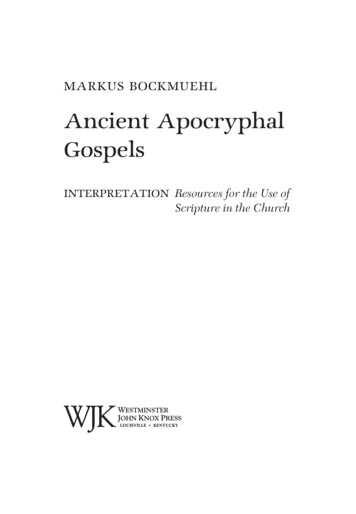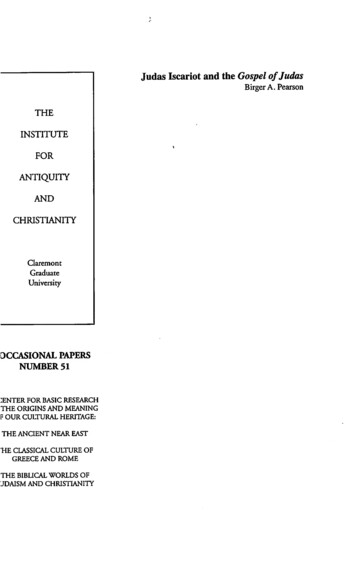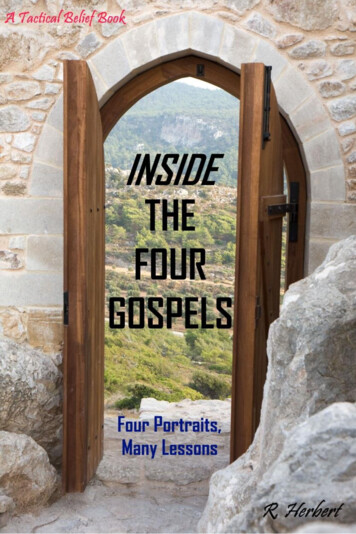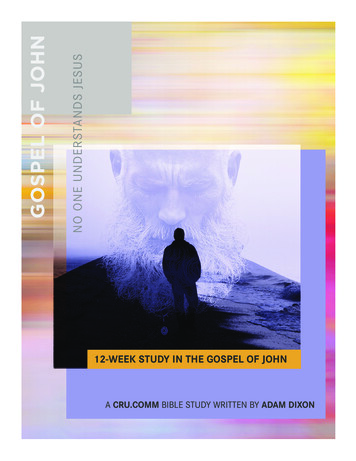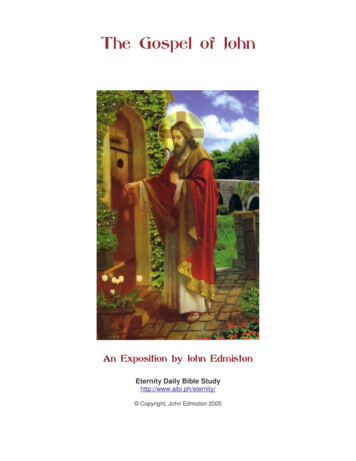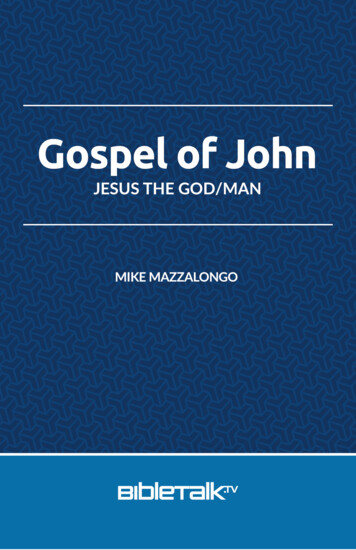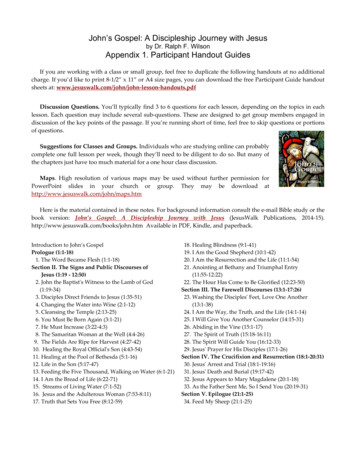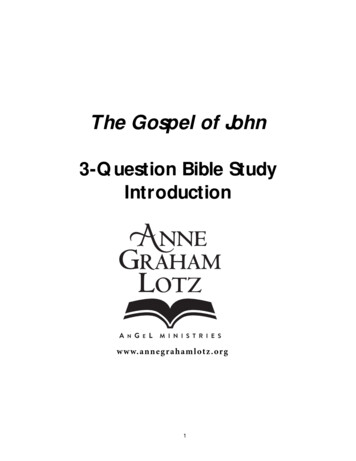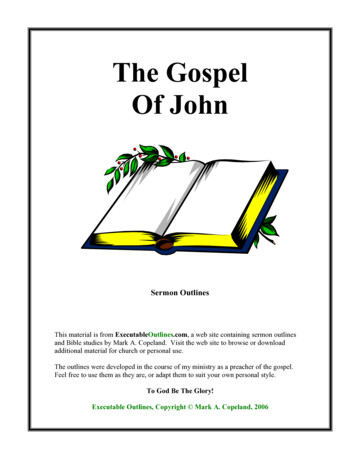
Transcription
The GospelOf JohnSermon OutlinesThis material is from ExecutableOutlines.com, a web site containing sermon outlinesand Bible studies by Mark A. Copeland. Visit the web site to browse or downloadadditional material for church or personal use.The outlines were developed in the course of my ministry as a preacher of the gospel.Feel free to use them as they are, or adapt them to suit your own personal style.To God Be The Glory!Executable Outlines, Copyright Mark A. Copeland, 2006
Mark A. CopelandThe Gospel Of JohnTable Of ContentsThe Pre-Existence Of Jesus (1:1-5)Bearing Witness Of The Light (1:6-8)Receiving The Light (1:9-13)They Beheld His Glory (1:14-18)The Testimony Of John The Baptist - I (1:19-34)The First Disciples (1:35-51)The Water Turned To Wine (2:1-12)The Cleansing Of The Temple (2:13-25)The New Birth (3:1-21)The Testimony Of John The Baptist - II (3:22-36)Seven Principles Of Personal Evangelism (4:1-26)The Gift Of Living Water (4:10-14)Worship In Spirit And Truth (4:20-24)One Sows And Another Reaps (4:35-38)All Should Honor The Son (5:16-30)The Insufficiency Of The Scriptures (5:37-40)Two Kinds Of Food (6:27)To Whom Shall We Go? (6:67-69)Even His Brothers Did Not Believe (7:1-9)The Proof Is In The Pudding (7:17)The Promise Of The Spirit (7:37-39)The Light Of The World (8:12)The Truth Shall Set You Free (8:31-36)Is God Your Father? (8:42)By This All Will Know (13:34-35)The Way, The Truth, And The Life (14:6)Fruit-Bearing Discipleship (15:8)The Greatest Prayer Ever Prayed (17:1-26)Father.Glorify Your Son (17:1-5)This Is Eternal Life (17:2-3)I Pray For Them (17:6-19)For Those Who Will Believe (17:20-26)That The World May Believe (17:20-23)What Is Truth? (18:37-38)Sermons From 679818487909396991032
Mark A. CopelandThe Pre-Existence Of ChristJohn 1:1-5INTRODUCTION1. The gospel of John was written for a simple purpose.a. To produce faith in Jesus as the Christ, the Son of God - Jn 20:30-31ab. To share the “life” that comes through such faith - Jn 20:31b2. To encourage us to have faith in Jesus Christ.a. John begins his gospel with a prologue - Jn 1:1-18b. In which he makes several claims as to who Jesus was1) He refers to Jesus in this prologue as “the Word”2) That he refers to Jesus is evident from verses 14-183. The very first claim pertains to the pre-existence of Christ.a. That He existed in the beginning, long before being born of Mary - cf. Jn 1:1-2b. That His work in the beginning has great significance for us - cf. Jn 1:3-5[John is not alone in proclaiming “The Pre-Existence Of Christ.” Elsewhere in the Scriptures wefind.]I. EVIDENCE FOR THE PRE-EXISTENCE OF CHRISTA. FORETOLD BY THE PROPHETS.1. Micah prophesied of the pre-existence of the Messiah to come - Mic 5:22. Isaiah spoke of the King to come as “Everlasting Father” - Isa 9:6-73. Zechariah recorded the Messiah’s own promise to come - Zech 2:10-11B. AFFIRMED BY JESUS HIMSELF.1. In His claim to have existed in Abraham’s day - Jn 8:56-582. In His prayer shortly before His arrest and crucifixion - Jn 17:4-5,243. In the revelation He gave to John - Re 22:13C. DECLARED BY HIS APOSTLES.1. By John in his gospel, and also his epistle - Jn 1:1-4; 1 Jn 2:142. By Paul in his epistlesa. To the church in Corinth - 1 Co 10:1-4; 2 Co 8:9b. To the church in Philippi - Ph 2:5-8c. To the church in Colosse - Co 1:16-17D. ILLUSTRATED BY THE CREATION.1. All things were created by Jesus - Jn 1:3; He 1:2-32. Necessitating His existence before creation - Co 1:16-173. Implying His own eternal power and divine nature - Ro 1:20Sermons From John3
Mark A. Copeland[These are remarkable claims concerning Jesus, even blasphemous if not true. Yet if true (and John’sgospel is designed to prove that it is), consider.]II. SIGNIFICANCE OF THE PRE-EXISTENCE OF CHRISTA. HE IS DEITY.!1. Especially when we consider the nature of His pre-existencea. His going forth were “from everlasting” - cf. Mic 5:2b. He was the eternal “I Am” - Jn 8:58; cf. Exo 3:13-142. As made clear in John’s prologue - Jn 1:1-2a. He was “with” God (implying a personal communion with God)b. He “was” God (explicitly stating His deity)-- Thus He is worthy of our love and adoration - cf. Jn 20:28B. HE IS LIFE.!1. By virtue of being the Creator and the Sustainer of lifea. All things were made by Him - Co 1:16b. All things are held together (NASV, NRSV) by Him - Co 1:172. Again, as John makes clear in his prologue - Jn 1:3-4a. Without Him, nothing was madeb. In Him was life itself-- Thus He gives us hope for our own resurrection! - cf. Jn 5:21; 11:25C. HE IS LIGHT.!1. We live in a world of darkness.a. Where people spend their lives stumbling in ignoranceb. Alienated from the life of God because of their ignorance - cf. Ep 4:17-192. As the Creator and Sustainer of life itself.a. Jesus is uniquely qualified to bring light into the world - Jn 1:4b. He calls for us to believe that we might become “sons of light” - Jn 12:35-36-- Thus Jesus offers us the “light of life” - Jn 8:12CONCLUSION1. Sadly, many resist the life and light Jesus offers.a. Some tried to destroy Him, but did not succeed - cf. Jn 1:5 (NRSV)b. Many try to avoid Him, knowing that it will mean changes to their lifestyle - cf. Jn 3:19-202. But for those willing to come to Jesus.a. He offers us hope and guidance in this life - cf. Mic 5:4-5ab. He is capable of fulfilling His promises - cf. Mt 11:28-30For He is no mere man, whose existence began when born by Mary, but “whose goings forth are fromof old, From everlasting.” - Mic 5:2Sermons From John4
Mark A. CopelandBearing Witness Of The LightJohn 1:6-8INTRODUCTION1. In the prologue to his gospel, the apostle John introduces another man named John.a. A man who was sent from God - Jn 1:6b. A man who came to bear witness of the Light - Jn 1:7-- This man, of course, was John the Baptist2. John the apostle makes it clear that this other “John” was not the Light.a. Not only here in the prologue - Jn 1:8b. But also immediately following the prologue - Jn 1:19-203. John the Baptist’s purpose in bearing witness of the Light.a. That all might believe - Jn 1:7b. The same reason John the apostle wrote his gospel - Jn 20:30-314. John was not the only person to bear witness of the Light.a. Others did before he cameb. Others have since he came[Indeed, even we have a responsibility to bear witness of the Light! Before we consider how, let’s notethose who have done so in the past.]I. THE FORERUNNERS OF CHRISTA. THE OLD TESTAMENT PROPHETS.1. They foretold the sufferings of Christ, and the glories to follow - 1 Pe 1:10-11a. E.g., the prophet Isaiah - Isa 7:14; 9:6-7; 53:4-6b. E.g., the prophet Micah - Mic 5:2c. It has been estimated that there are more than 300 prophecies concerning Christ2. Jesus reminded His disciples of this trutha. To the two disciples on the road to Emmaus - Lk 24:25-27b. Later to the apostles in Jerusalem - Lk 24:44-47B. JOHN THE BAPTIST.1. Foretold by Isaiah - Isa 40:32. Identified as such by Matthew, Mark, and Luke - Mt 3:1-3; Mk 1:1-4; Lk 3:1-63. John the apostle relates how John the Baptist bore witness of the Lighta. Declaring Jesus to be “The Lamb of God” - Jn 1:29,35-36b. Declaring Jesus to be “The Son of God” - Jn 1:34[Both the prophets and John bore witness to Jesus prior to His ministry. During the course of Hisministry, there was another One who bore witness of the Light.]II. THE FATHER OF CHRISTSermons From John5
Mark A. CopelandA. HE BORE WITNESS THROUGH SIGNS.1. Through the miracles Jesus did - cf. Jn 5:36-37; 10:25,37-382. Even as Nicodemus and the man born blind realized - cf. Jn 3:2; 9:32-33B. HE BORE WITNESS THROUGH HIS VOICE FROM HEAVEN.1. At the baptism of Jesus - Mt 3:16-172. At the mount of transfiguration - Mt 17:53. At Jerusalem during the last week - Jn 12:27-30C. HE BORE WITNESS THROUGH RAISING JESUS FROM THE DEAD.1. Declaring Jesus to be the Son of God with power - Ro 1:3-42. Declaring Jesus to be One will judge the world - Ac 17:30-31[When the Father raised Jesus from the dead, He was seen by select witnesses who in turn werecommanded to add their witness of the Light (Ac 10:40-43). But not just the apostles; in some ways wecan say that witnesses of the Light includes all.]III. THE FOLLOWERS OF CHRISTA. THE APOSTLES OF CHRIST.1. They bore witness through their eyewitness testimonya. In this they are very special witnesses - cf. Jn 15:27; Ac 1:8; 5:30-32; 13:30-31b. Providing empirical evidence - cf. 1 Jn 1:1-2; 2 Pe 1:16-182. They bore witness through their lives and deatha. Enduring great hardship for their testimony - cf. 1 Co 4:9-13b. Giving credence to the truthfulness of their testimony!B. THE DISCIPLES OF CHRIST.1. Their unity with one another bears witness - Jn 17:20-23a. Through our unity we bear witness to the fact:1) Jesus was sent by God2) God loves the worldb. Should make one think how Jesus feels about congregational infighting, denominationaldivision, etc.1) We know how Paul feels - cf. 1 Co 1:10-13; 3:3-42) We know what conduct is worthy of our calling - cf. Ep 4:1-32. Their transformed lives also bears witnessa. As evidence of the influence of Christ in their lives - cf. 2 Co 3:18; 4:61) Whose truth teaches us how to live in righteousness and holiness - cf. Ep 4:17-242) Enabling us to “shine as lights in the world” as we reflect the glory of His light in ourlives - Ph 2:12-16b. Should make one think how we can be of much use if we are not being transformed1) By failing to renew of our minds - cf. Ro 12:1-22) By failing to put on the new man (a Christ-like character) - cf. Co 3:9-173. Their proclamation of the Word bears witnessa. Our duty as the elect people of God is to proclaim His praises - 1 Pe 2:9-102) How we obtained His mercyb. Should make one think of how little use we are if we remain silentSermons From John6
Mark A. Copeland1) By not spreading the gospel - cf. Ac 8:42) By not sounding forth the Word - cf. 1 Th 1:8CONCLUSION1. Those in the past faithfully bore witness of the Light.a. The forerunners (the prophets and John the Baptist)b. The followers (the apostles and early disciples)2. What about us today.?a. Do we bear witness of the Light by our unity with one another?b. Do we bear witness of the Light through transformed lives?c. Do we bear witness of the Light through proclaiming the Word?The purpose of bearing witness of the Light is so others can believe (Jn 1:7). Do we help or hinderthose around us to believe in Jesus?Don’t quench the Father’s efforts, who would have each of us bear witness of the Light!“For it is the God who commanded light to shine out of darkness, who has shone inour hearts to [give] the light of the knowledge of the glory of God in the face of JesusChrist.” (2 Co 4:6)“For you were once darkness, but now [you are] light in the Lord. Walk as children oflight.” (Ep 5:8)Sermons From John7
Mark A. CopelandReceiving The LightJohn 1:9-13INTRODUCTION1. In the prologue to his gospel, John introduces Jesus as “the light”.a. That shines in darkness - Jn 1:5b. To whom John bore witness - Jn 1:6-8c. Who gives light to every man - Jn 1:92. Yet John declares what becomes evident later in his gospel.a. Not everyone was willing to receive the light, i.e., Jesusb. Even His own people as a whole rejected Himc. But for those who did receive Him, they were truly blessed!3. The same remains true today.a. Many people do not receive Jesusb. Missing out on the wonderful blessings He offers![Why do people not receive Christ? How can we be sure to receive Him, and the blessings He offers as“The Light”? Let’s take a closer look at the text for our study.]I. MANY DID NOT RECEIVE THE LIGHTA. WHO DID NOT RECEIVE THE LIGHT.1. The world in general - Jn 1:9-10a. Even though He gives light to every man! - cf. Jn 1:4; 8:12; 12:46b. Even though the world was made through Him! - cf. Jn 1:32. His own people in particular - Jn 1:11a. He had come into His own land, Palestine - cf. Jer 2:7b. He had come to His own people, Israel - cf. Deu 7:6B. WHY THEY DID NOT RECEIVE THE LIGHT.1. They did not know Him - Jn 1:10a. Even His own brothers at first, though they did after His resurrection - Jn 7:5; Ac 1:14b. Familiarity often breeds contempt: “A prophet has no honor in his own country.”- Jn 4:442. Other reasons provided by John in his gospela. Some loved darkness more than light - Jn 3:19-20; 5:42-43b. Some were afraid of what others thought - Jn 7:13; 9:22c. Some were misinformed of the facts - Jn 7:40-43d. Some were hardened by their traditions - Jn 9:13-16e. Some loved the praise of men - Jn 12:42-43[For similar reasons today, many people do not receive Jesus. Yet some did.]II. SOME RECEIVED THE LIGHTSermons From John8
Mark A. CopelandA. THE BENEFITS OF RECEIVING THE LIGHT.1. The right to become children of God - Jn 1:12a. The word “right” signifies both authority and ability (JFB)b. Receiving Christ gives us the authority and ability to become sons of Godc. Which is wonderful manifestation of God’s love - cf. 1 Jn 3:1d. Making us heirs of God and joints heirs with Christ - cf. Ro 8:14-172. The privilege of being born of God - Jn 1:13a. Not of blood - i.e., by virtue of physical descentb. Not of flesh - i.e., by virtue of the lusts of the fleshc. Not of the will of man - i.e., by virtue of power in a man’s will aloned. But of God - i.e., a rebirth possible only by the Spirit of God - cf. Jn 3:5; Ti 3:5B. THE MEANS FOR RECEIVING THE LIGHT.1. To receive Christ, we must believe in His name - Jn 1:12ba. Which is to say we must believe in Himb. The name of a person is often put for the person himself (Barnes) - cf. Jn 2:232. Believing in Him gives us power “to become” a child of Goda. Faith in Jesus alone does not “make” one a child of Godb. Many believed in Jesus, but did not become His disciples1) Only by abiding in His doctrine did they become His disciples - Jn 8:30-322) Some believed, but were unwilling to confess Him - Jn 12:42-433. When faith moves us to obey Christ, then we become children of Goda. Faith makes us children of God when we put Christ on in baptism - Ga 3:26-271) We become children of God through faith, yes - but how?2) By putting Christ on when we are baptized into Christ!b. Jesus becomes the author of our salvation when we obey Him - He 5:91) Such as obeying His command to be baptized - Mk 16:162) Thereby born again of both water and the Spirit - Jn 3:5; Ti 3:54. Sadly, many misapply John’s words in Jn 1:12a. Teaching that one becomes a child of God simply by receiving Christ in faith1) By saying “the sinner’s prayer” (which is nowhere taught in the Scriptures)2) Often appealing to Re 3:20-21 (which is addressed to erring Christians, not lostsinners)b. Yet receiving Christ in faith gives one “power to become”, not “makes one become”1) We must appropriate that power through the obedience of faith2) Such as confessing our faith, repenting of our sins - Ro 10:9,10; Ac 17:313) Culminating our obedience by putting on (receiving) Christ in baptism - Ga 3:27CONCLUSION1. Jesus is the “True Light” who gives light to every man.a. Bringing grace and truth to those in sin and errora. Providing the way of salvation through His blood2. How sad that there are many in the world.a. Who do not know Himb. Who have not received Him-- Who spend their lives stumbling in the darknessSermons From John9
Mark A. Copeland3. But if you are willing to believe in His name.a. You have the right to become a child of God!b. You can be born of God!-- Provided your faith is an obedient faith, willing to abide in the doctrine of ChristLet the Word of God, and in particular John’s gospel (cf. Jn 20:30-31), point you in the direction of theLight, that you might be saved and have life in His name!Sermons From John10
Mark A. CopelandThey Beheld His GloryJohn 1:14-18INTRODUCTION1. In the last few verses of the prologue to his gospel, John identifies the Word.a. Who was in the beginning with God, and was God - Jn 1:1-2b. Through whom all things were made - Jn 1:3c. Who was life, and the light of men - Jn 1:4-5,9d. Who came into the world, though many did not receive Him - Jn 1:10-11e. Yet those who received Him, were given the right to become children of God - Jn 1:12-132. The Word was Jesus Christ.a. Who became flesh and lived among men - Jn 1:14b. Who glory was seen by men - Jn 1:143. The word “glory” as used here.a. Means “majesty, dignity, splendor” (Barnes)b. Pertaining to Christ, it refers to His personal excellence or majesty[John writes “We beheld His glory”. What majesty, dignity, or splendor did John and others see inJesus when He walked in the flesh among men.?]I. THEY BEHELD HIS GLORYA. THE GLORY OF HIS DEITY.1. “the glory as of the only begotten of the Father” - Jn 1:14a2. “The dignity which was appropriate to the only begotten Son of God” (Barnes)a. “Such glory or splendor as could belong to no other, and as properly expressed hisrank and character.”b. “This glory was seen eminently on the mount of transfiguration” - Lk 9:28-32; 2 Pe1:16-18c. “It was also seen in his miracles, his doctrine, his resurrection, his ascension” - cf. Jn2:11-- “All of which were such as to illustrate the perfections, and manifest the glory thatbelongs only to the Son of God.” (Barnes)B. THE GLORY OF HIS GRACE.1. “full of grace.grace for grace.grace and truth came through Jesus” - Jn 1:14b,16-172. “The word grace means favors, gifts, acts of beneficence.” (Barnes)a. “He was kind, merciful, gracious, doing good to all, and seeking man’s welfare by greatsacrifices and love;”b. “so much so, that it might be said to be characteristic of him, or he abounded in favorsto mankind.” (Barnes)C. THE GLORY OF HIS TRUTH.1. “full.of truth.truth came through Jesus Christ.” - Jn 1:14b,17Sermons From John11
Mark A. Copeland2. “He was also full of truth. He declared the truth. In him was no falsehood.” (Barnes)a. “He was not like the false prophets and false Messiahs, who were wholly impostors”b. “Nor was he like the emblems and shadows of the old dispensation, which were onlytypes of the true; but he was truth itself.”3. “He represented things as they are, and thus became the truth as well as the way and thelife.” - cf. Jn 14:6 (Barnes)D. THE GLORY OF HIS PREEMINENCE.1. “He who comes after me is preferred before me.” - Jn 1:152. As witnessed to by John the Baptist - cf. Jn 1:27,29-303. John the Baptist recognized His superiority, as did the apostle Paula. By virtue of His preexistence (“He was before me”) - cf. also Jn 8:58; 17:5b. By virtue of His creative powers - cf. Co 1:16-17E. THE GLORY OF HIS REVELATION.1. “No one has seen God at any time. The only begotten Son.He has declared Him” - Jn1:18a. “This passage is not meant to deny that men had witnessed manifestations of God, aswhen he appeared to Moses and the prophets (cf. Num 12:8 Isa 6:1-13).”b. “.it is meant that no one has seen the essence of God, or has fully known God.”c. “The prophets delivered what they heard God speak; Jesus what he knew of God as hisequal, and as understanding fully his nature.” (Barnes)2. Jesus manifested or declared the Father as no one had done before!a. As Jesus told Philip - Jn 14:9b. As Jesus expressed in His prayer - Jn 17:6,24c. As the apostles wrote in their epistles - Co 1:15; He 1:1-43. “This verse proves that, Jesus had a knowledge of God above that which any of the ancientprophets had, and that the fullest revelations of his character are to be expected in thegospel.” (Barnes)a. “By his Word and Spirit he can enlighten and guide us, and lead us to the trueknowledge of God;”b. “There is no true and full knowledge of God which is not obtained through his Son.”[What a wonderful experience it must have been to behold the glory of God’s only begotten Son! Itundoubtedly transformed the life of John and others who saw Him. By the grace of God, it also possiblethat.]II. WE CAN BEHOLD HIS GLORYA. IN THIS LIFE.1. We can behold His glory.a. The glory of His deity, grace and truth!b. The glory of His preeminence and revelation!2. How? Through the words of His eyewitnesses!a. Who made known the power and coming of our Lord - cf. 2 Pe 1:16-18b. Who declared what they heard, saw, even handled, that we might share with them intheir fellowship with the Father and Son - cf. 1 Jn 1:1-4; 5:11-13-- Through their gospels, their letters, their inspired writings, we can behold His glory!3. Indeed, we must behold His glory to be transformed!Sermons From John12
Mark A. Copelanda. Our transformation is fundamental to true discipleship - cf. Ro 8:29; 12:1-2b. Our transformation is gradual, occurring as we behold His glory - cf. 2 Co 3:18c. Our transformation involves renewing the mind, a mind set on things above where Christis - cf. Ro 12:1-2; Co 3:1-2B. WHEN HE COMES AGAIN.1. We will behold His glory.a. When He appears - Co 3:4b. When He comes again, to be glorified in His saints - 2 Th 1:102. Indeed, every one will behold His glory.a. For every eye will see Him - cf. Re 1:7b. For every knee will bow, and every tongue confess Him - cf. Ph 2:9-11CONCLUSION1. “And the Word became flesh and dwelt among us, and we beheld His glory.” - Jn 1:142. We may not have seen Jesus in the flesh, but we can still behold His glory.a. Even now, through the testimony of His apostles and the Word of Godb. Even then, when Jesus comes again to be revealed in His glory3. What will we do with the glory of Jesus as declared by His apostles.?a. We should let it transform our lives as we behold the glory of the Lord - 2 Co 3:18b. Then when Christ comes, we will be glorified together with Him! - 2 Th 1:10Here is Paul’s prayer for the Thessalonians.“Therefore we also pray always for you that our God would count you worthy of thiscalling, and fulfill all the good pleasure of His goodness and the work of faith withpower, that the name of our Lord Jesus Christ may be glorified in you, and you inHim, according to the grace of our God and the Lord Jesus Christ.” (2 Th 1:11-12)May his prayer be fulfilled in our lives, along with this prayer from Jude.“Now to Him who is able to keep you from stumbling, and to make you stand in thepresence of His glory blameless with great joy, to the only God our Savior, throughJesus Christ our Lord, be glory, majesty, dominion and authority, before all time andnow and forever. Amen.” (Jude 24-25)Sermons From John13
Mark A. CopelandThe Testimony Of John The Baptist - IJohn 1:19-34INTRODUCTION1. In the prologue to John’s gospel, we were introduced to John the Baptist.a. A man sent from God - Jn 1:6b. Who came to bear witness of the Light - Jn 1:7-8c. Who bore witness to the preeminence and preexistence of the Light - Jn 1:152. As John begins the narrative portion of his gospel, he starts with John the Baptist.a. His testimony to priests and Levites from the Pharisees in Jerusalem - Jn 1:19-28b. His testimony the next day when he saw Jesus - Jn 1:29-34[What did John the Baptist testify concerning Jesus? What lessons might we glean from his testimony?We note first of all that John the Baptist proclaimed.]I. I AM NOT THE CHRISTA. HIS TESTIMONY ABOUT HIMSELF.1. He confessed he was not the Christ - Jn 1:19-20a. Many people wondered if he were the Christ - cf. Lk 3:15b. John clearly asserts that he was not the Christ2. He was not literally Elijah as foretold by Malachi - Jn 1:21aa. Some thought Elijah would return in person, which John denies - cf. Mal 4:5b. John did fulfill the prophecy, which was figurative1) As foretold by the angel Gabriel - cf. Lk 1:l72) As testified by Jesus - cf. Mt 11:11-15; Mt 17:10-133. He was not the Prophet foretold by Moses - Jn 1:21ba. Moses foretold a Prophet like him would come - cf. Deu 18:15-18b. Many people were anticipating the arrival of this Prophet - cf. Jn 6:14; 7:40c. This Prophet was indeed Jesus, not John - cf. Ac 3:22-264. He was the one foretold by Isaiah - Jn 1:22-23a. The voice of one crying in the wilderness - cf. Isa 40:1-3b. Sent to prepare the way of the Lord - cf. Lk 1:16-17; 2:76-79B. LESSONS FROM HIS TESTIMONY.1. John’s example is a powerful one for all Christians, especially ministers2. As followers of Christ, our task is similar to his role as forerunnera. To deflect attention away from ourselves, and point people to Christ!b. Let us never forget, no matter how honored we may be, we are not the Christ![As John continues with his testimony, he proclaims concerning Jesus.]II. HE IS PREFERRED BEFORE MEA. HIS TESTIMONY ABOUT CHRIST.Sermons From John14
Mark A. Copeland1. Given in response to those from the Pharisees - Jn 1:24-25,28a. Why did he baptize, if not Christ, Elijah, or the Prophet?b. For he had been baptizing in Bethabara (or Bethany) beyond the Jordan2. The One coming after him is preferred before him - Jn 1:26-27a. Even One who was in their midst as he spoke!b. Whose sandal strap not even John was not worthy to loose!3. The reason Jesus was preferred before him?a. “For He was before me” (i.e., because of His preexistence) - cf. Jn 1:15,30b. “Who is mightier than I” (i.e., because of His power) - cf. Mk 1:74. John would later reaffirm Jesus' preference over himselfa. “He must increase, but I must decrease” - Jn 3:30b. He is “above all” - Jn 3:31B. LESSONS FROM HIS TESTIMONY.1. We should not hesitate to exalt Jesus over self - cf. Lk 9:23-24a. He is preferred before usb. While we may be the body of Christ, He is the head! - cf. Ep 1:22-232. Jesus deserves our humble service and adorationa. Because of His power - cf. Co 1:16b. Because of His preexistence - cf. Co 1:17c. Because of His headship over the body, the church - cf. Co 1:18[On the next day, John the Baptist had another opportunity to testify concerning Jesus, in which hedeclared.]III. BEHOLD! THE LAMB OF GODA. HIS TESTIMONY ABOUT CHRIST.1. Declaring Jesus as “the Lamb of God who takes away the sin of the world!” - Jn 1:29a. As foretold by Isaiah - cf. Isa 53:4-7,10-12b. As later proclaimed by the apostles - cf. 1 Co 15:3; 1 Pe 2:24; 1 Jn 2:22. Identifying Jesus as the “Man who is preferred before me” - Jn 1:30a. Because He was before John (i.e., His preexistence)b. Even more so now as the Savior of the world!B. LESSONS FROM HIS TESTIMONY.1. We should never forget the basis of our salvation!a. We are not saved on the basis of our good deeds - cf. Ti 3:5b. We are saved by the blood of the Lamb! - cf. Re 1:5; 5:9; Ro 5:12. We should ever point the world to Jesus!a. He is their only hope for forgiveness of sins! - cf. 1 Ti 2:5-6b. We should proclaim Jesus Christ and Him crucified! - cf. 1 Co 2:2[If Jesus is truly “preferred before” us, we will never hesitate to offer Him as the Lamb who takes awaythe sin of the world. Finally, we note John’s testimony concerning Jesus that.]IV. THIS IS THE SON OF GODA. HIS TESTIMONY ABOUT CHRIST.Sermons From John15
Mark A. Copeland1. “I did not know Him” - Jn 1:31,33a. Though related, Jesus lived in Nazareth, John in the Judean desertb. Even if there had been a casual acquaintance, John did not know Jesus as the Messiahc. Yet John came baptizing with water1) That the Christ might be revealed to Israel2) For upon whom the Spirit would descend, would be the One who baptizes with theHoly Spirit - cf. Mt 3:112. “I saw the Spirit descending.and He remained upon Him” - Jn 1:32a. Just as John was told to anticipate - Jn 1:33b. Which occurred when Jesus was baptized by John - cf. Mt 3:163. “I have seen and testified that this is the Son of God.” - Jn 1:34a. John saw the Spirit descend upon Jesus like a dove - cf. Mt 3:16b. John testified to the same truth as spoken from above: “This is My beloved Son” - cf.Mt 3:17B. LESSONS FROM HIS TESTIMONY.1. We must be willing to confess Jesus as did John - cf. Mt 10:32-332. We must confess Him to be the Son of Goda. As did Nathanael - cf. Jn 1:49b. As did Peter - cf. Jn 6:68-69c. As did Martha - cf. Jn 11:273. We must believe Jesus to be the Son of God in order to be saveda. As John declares in his gospel - Jn 20:31b. As the Ethiopian eunuch confessed in order to be baptized - cf. Ac 8:37CONCLUSION1. John the Baptist would later offer more testimony of Jesus - Jn 3:22-262. Jesus would later describe the testimony of John.a. He bore witness to the truth - Jn 5:33b. He was the burning and shining light - Jn 5:35c. In which some were willing to rejoice - Jn 5:353. Are we willing to rejoice in the testimony of John.?a. Knowing that John was not the Christ?b. Understanding that Jesus is preferred above John and all others?c. Accepting Jesus to be the true Lamb of God who takes away the sin of the world?d. Willing to confess along with John that Jesus is the Son of God?If we are willing to accept the testimony of John the Baptist and obey the Son of God, eternal life can beours! - cf. Jn 3:36; He 5:9; Mk 16:16Sermons From John16
Mark A. CopelandThe First DisciplesJohn 1:35-51INTRODUCTION1. The ministry of John the Baptist was to prepare the way to Jesus.a. He came to bear witness of the Light, that all might believe - Jn 1:6-8b. John indeed did bear witness of Jesus1) As the Lamb of God who takes away the sin of the world - Jn 1:292) As the Son of God who baptizes with the Holy Spirit - Jn 1:32-342. Due to the testimony of John the Baptist, Jesus began to attract disciples.a. The first disciples were those who had been disciples of John - Jn 1:35-36b. Because of John’s testimony, they began to follow Jesus - Jn 1:37-39[In his gospel, John the apostle describes those who were “The First Disciples”, beginning with.]I. TWO BROTHERSA. ANDREW.1. His backgrounda. From Bethsaida of Galilee - cf. Jn 1:44b. Brother of Simon Peter, sons of Jonah - cf. Jn 1:42c. A fisherman - cf. Mt 4:182. His call to discipleship and then apostleshipa. He was first a disciple of John the Baptist, who pointed him to Jesus - Jn 1:35-401) This happened in Bethabara beyond the Jordan - cf. Jn 1:282) Some thi
Sermons From John 5 Bearing Witness Of The Light John 1:6-8 INTRODUCTION 1. In the prologue to his gospel, the apostle John introduces another man named John. a. A man who was sent from God - Jn 1:6 b. A man who came to bear witness of the Light - Jn 1:7-- This man, of course, was John the Baptist 2.File Size: 893KB
